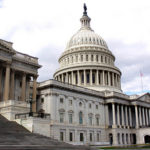WASHINGTON—The tax-reform package U.S. House of Representative leaders released Nov. 2 includes a measure that would weaken the Johnson Amendment—a provision in the tax code that bars churches from endorsing political candidates without jeopardizing their tax-exempt status.
The tax proposal drew criticism from advocates for separation of church and state, who insisted the measure would politicize houses of worship.
‘Deform, not reform’
“This tax bill will deform, not reform, the tax law that protects our houses of worship,” said Amanda Tyler, executive director of the Baptist Joint Committee for Religious Liberty.
“Gutting the law that protects 501(c)(3) (tax-exempt not-for-profit) organizations from candidates pressing for endorsements threatens to destroy our congregations from within over disagreements on partisan campaigns.”
The Johnson Amendment protects the freedom of ministers to “speak truth to power and preach on moral issues, no matter how controversial,” Tyler added.
“Pastors and people of faith know that there’s nothing free about a pulpit that is bought and paid for by political campaign donations or beholden to partisan interests,” she said.
In August, more than 4,000 faith leaders signed a letter urging Congress to maintain the Johnson Amendment.
The proposed change in the tax law “has been pushed by a tiny minority and is opposed by the vast majority of Americans and churchgoers, across party lines and faith traditions,” Tyler said.
‘This is bad policy’
The Trump Administration and House leaders are “trying to change the tax code so they can pressure churches for endorsements,” said Maggie Garrett, legislative director of Americans United for Separation of Church and State.
Sign up for our weekly edition and get all our headlines in your inbox on Thursdays
“They very clearly want to use congregations as political tools for their own benefit,” Garrett said.
“This flies in the face of the American promise of separation of church and state, and it’s blatantly unconstitutional. … This is bad policy. It’s bad for churches, and it’s bad for American taxpayers who will potentially see their money going to support partisan political operations being run out of church basements. This will further divide Americans in spaces that are specifically meant to bring them together.”
Kathryn Freeman, director of public policy for Texas Baptists’ Christian Life Commission, also expressed concern about diluting the Johnson Amendment, noting ministers already are free to “give their congregations biblical insights into public policy and ethical issues.”
“But I am worried that this is just an attempt to politicize our places of worship and to sow division and mistrust at a time when our nation needs Christ-followers to speak prophetically in the public square, while also demonstrating Christ’s love and concern for all, no matter their political affiliation,” Freeman said.
In addition, Freeman also expressed concern about cuts to the adoption tax credit in the House tax-reform proposal.
“As pro-life advocates know, adoption is an important and critical alternative to abortion,” she said.













We seek to connect God’s story and God’s people around the world. To learn more about God’s story, click here.
Send comments and feedback to Eric Black, our editor. For comments to be published, please specify “letter to the editor.” Maximum length for publication is 300 words.